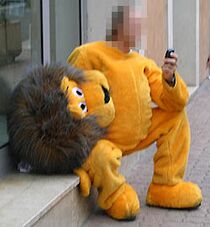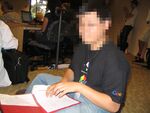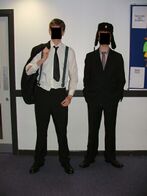Pixellated Face Disease
Pixellated Face Disease (or PFD) is a strange and disturbing phenomenon whereby an individual's face becomes blurred and blocky for seemingly no apparent reason. Any individual, no matter how law-abiding or innocent can contract the disease whilst going about their everyday life.
However, the single most disturbing aspect of the condition is that , much like ghosts, the effects can only be seen when the infected individual is viewed on film or photographic format. Thus, one will never know if one has the condition until they appear on World's Wildest Police Chases or CCTV Uncovered.
Symptoms
Many symptoms have been witnessed in conjunction with PFD. Following is a selection of the most common:
- Monsterism, also often referred to as Zombification. A process whereby an individual takes on the characteristics of a monster such as a pygmy giant, most notably a deep, low droning voice. The person in question also begins to move much more deliberately, almost as if they were in slow motion.
- Pixellated genital disease. Often the individual with PGD will display this condition as well. Just as grave as PFD, it can be witnessed when the individual takes their pants off on film. Since the early 1990's, this condition has been seen increasingly in streakers.
- Blurred registration plateism. The affected individual will usually contaminate any vehicle which they drive with a similar affliction. This mainly affects the number plate, which takes on a similar pixellated form to the individual's face.
- Pixellated finger disease. An increasingly common mutation, most commonly seen amongst rappers and rock stars. This strand only ever effects the back of the index and first fingers when they are waved in an aggressive manner: known sufferers include 50 Cent and Noel Gallagher and most people at football matches.
- Full Body Pixellation. In some rare cases, individuals will undergo this most extreme pixellation. Sufferers have been known to take up careers as giant lego men and movie monsters without the need for costumes.
- Blurred Advertisement. It is also known for the disease to spread to people's property, from t-shirts to bottles of water. all advertisements of the item will become blurry and the individual is free from the horrible disease.
Note that all these characteristics are only witnessed when the subject is caught on film. If you see anybody displaying these symptoms in real life, then this means that your eyes have been replaced by cameras, probably by the government. It is advised that you therefore don't partake in any espionage, terrorism or DVD piracy, because you're being watched. Also, could you please look at some boobies? Clive in surveillance gets lonely.
Cure
There is currently no known cure for the Pixellated Face Disease. Scientists are baffled by the fact the sufferer will display almost no symptoms until caught on film. The individual will go through life looking like any other ordinary person criminal. Thus, the current advice for those that fear they have the disease is to spend their lives avoiding cameras.
Whilst this is relatively easy for those living in poorer areas such as Wigan which the camera phone has yet to permeate, it is very hard for a PFD sufferer to go unnoticed in places such as Soho or Amsterdam, where large amounts of secret cameras have been set up to make 'home-movies'.
Tragic Tale
One sufferer of pixellated face disease, James Jameson, 24 from Iowa, speaks:
| “ | I was afraid that I might have PFD because at random intervals I began to see green and blue boxes in front of my eyes. To make sure, I took my handgun down to the local bank and ordered the cashier to hand over $500, all the time while staring straight at the security cameras to ensure my face was properly captured. | ” |
| “ | It was an agonising wait until the court appearance. You can imagine my relief when the CCTV footage of the robbery was shown to the jury and it showed my face was in fact not pixellated. I could hardly contain my excitement. | ” |
Unfortunately, the judge extended Jameson's sentence as a result of his unnecessary outburst. He is currently serving fifteen years for armed robbery and irresponsible use of a firearm.
Hope for the sufferer
There is, however, hope for the PFD sufferer: many infected individuals will go on to lucrative employment in the media.
Chris Evans, in spite of his cubic facial features, became a celebrated television presenter in the 1990s. Unfortunately, the public's pre-determined conception of those with a pixellated face is that of an untrustworthy individual likely to steal your money. In the case of Evans, this proved to be correct.
Furthermore, sufferers of PFD often go on to achieve lucrative contracts in the visual media, in particular Crimewatch reconstructions and eBoy promotional videos.
Lots of radio DJs are known to have PFD and go to great pains to hide their condition. This is part of the reason why those local radio presenters are never seen on the television. The other reason is that they are just plain idiotic fools.
Sufferers have increasingly been seen in the world of video gaming, where the condition is common. Guiseppe Mariano is perhaps the most famous example. Originally finding employment in the plumbing industry, he turned to the new media of video games where he soon became recognised worldwide as the man with the pixellated face.
Many sports mascots are sufferers of PFD. It is thought the masking of their condition is an aid to boosting self confidence and gaining acceptance in society. This is, however, why they hardly ever take their 'head' off in public and why kids are so upset at seeing Leroy the Lion headless.
Similar conditions
- The most common condition associated with PFD is 'black strip' syndrome where the face remains largely unaffected, all except for the eyes, which seem to be covered with a strip of black cardboard that sticks to the forehead. This can also affect any sports logos that differ from the programme's sponsor which the individual may be wearing at the time. The worst case of 'black strip' syndrome is when the whole face is affected, not just the eyes.
- Similar to PFD is "blurry face disease", which is similar except that facial features, advertisements, vulgar words/images, etc are blurry.
- On rare occasions, PFD will spread not only from the sufferers face to body, but also into the surrounding environment. It will infect inorganic objects such as license plates, signs and brand names. This form of PFD is known as Pixellated Inorganic Subject Syndrome.
- Like diseases such as cancer and Scientology, PFD will at times penetrate the surface, & move into the internal organs of the sufferer, usually seeming to affect the tounge, throat or tonsils. This is purely speculation, as like regular PFD, this variation of the disease can only be observed in televised conditions. This phase of the disease manifests itself as a distortion of the voice, the afflicted unable to sound like a normal human being. Instead, the sufferer has the possibility of sounding like Darth Vader, or a five year old girl on helium, with very little varience in between.
See also
External links
| Featured version: 3 September 2006 | |
| This article has been featured on the main page. — You can vote for or nominate your favourite articles at Uncyclopedia:VFH. | |





